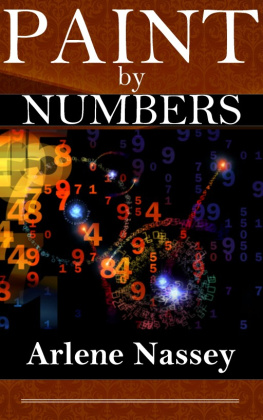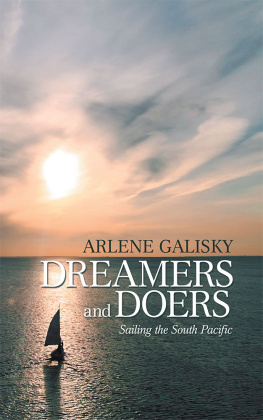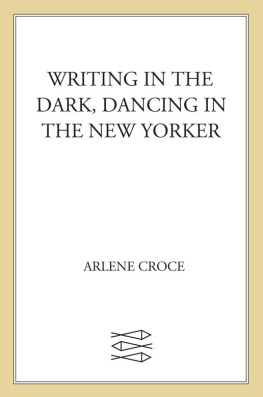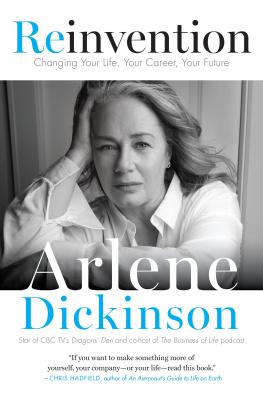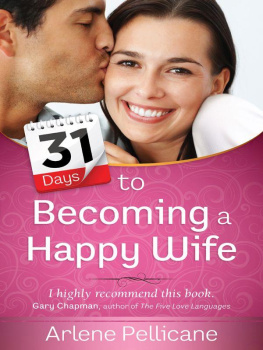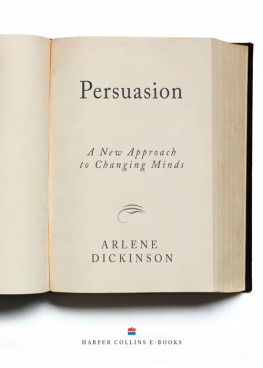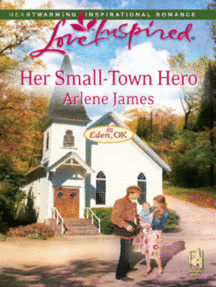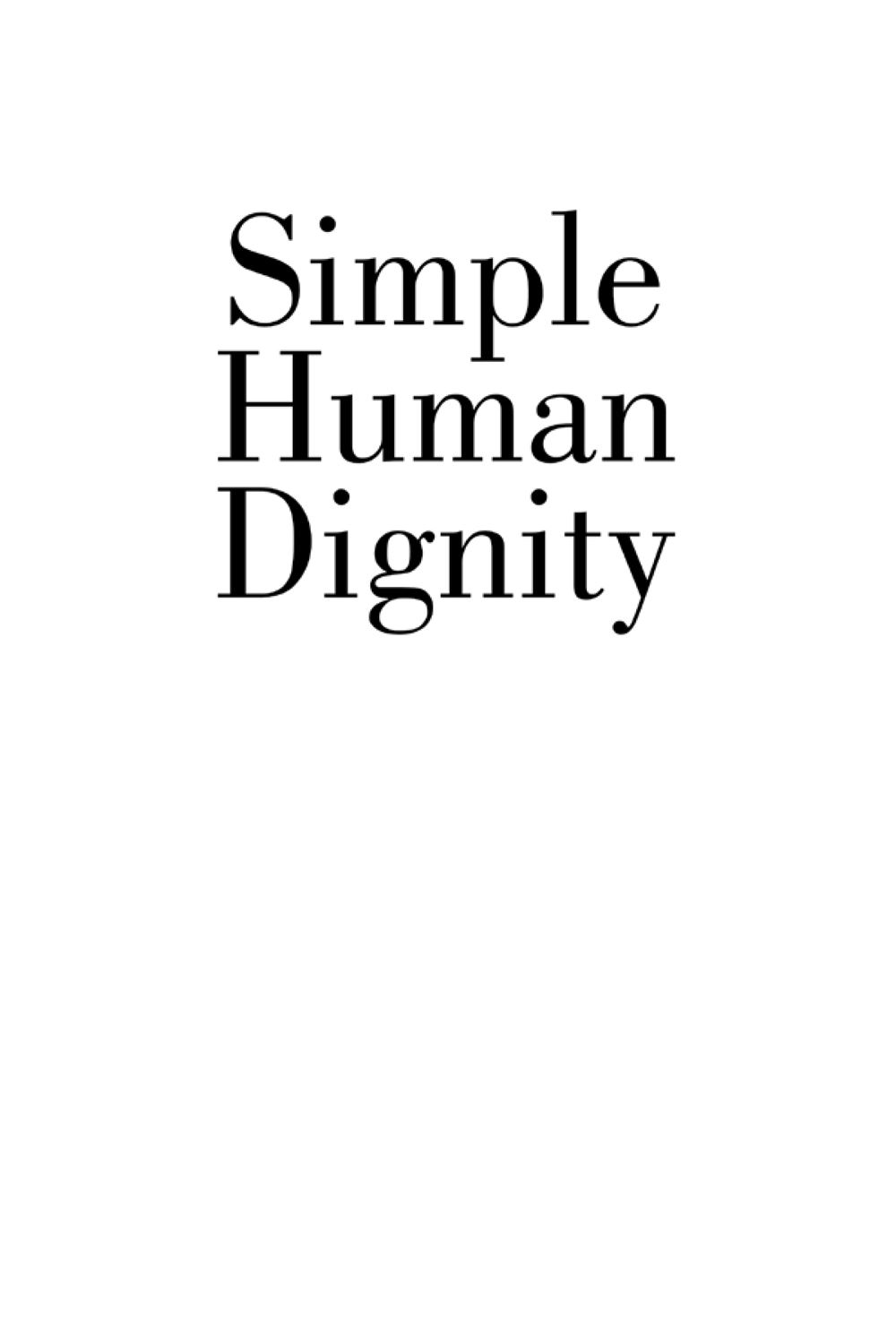
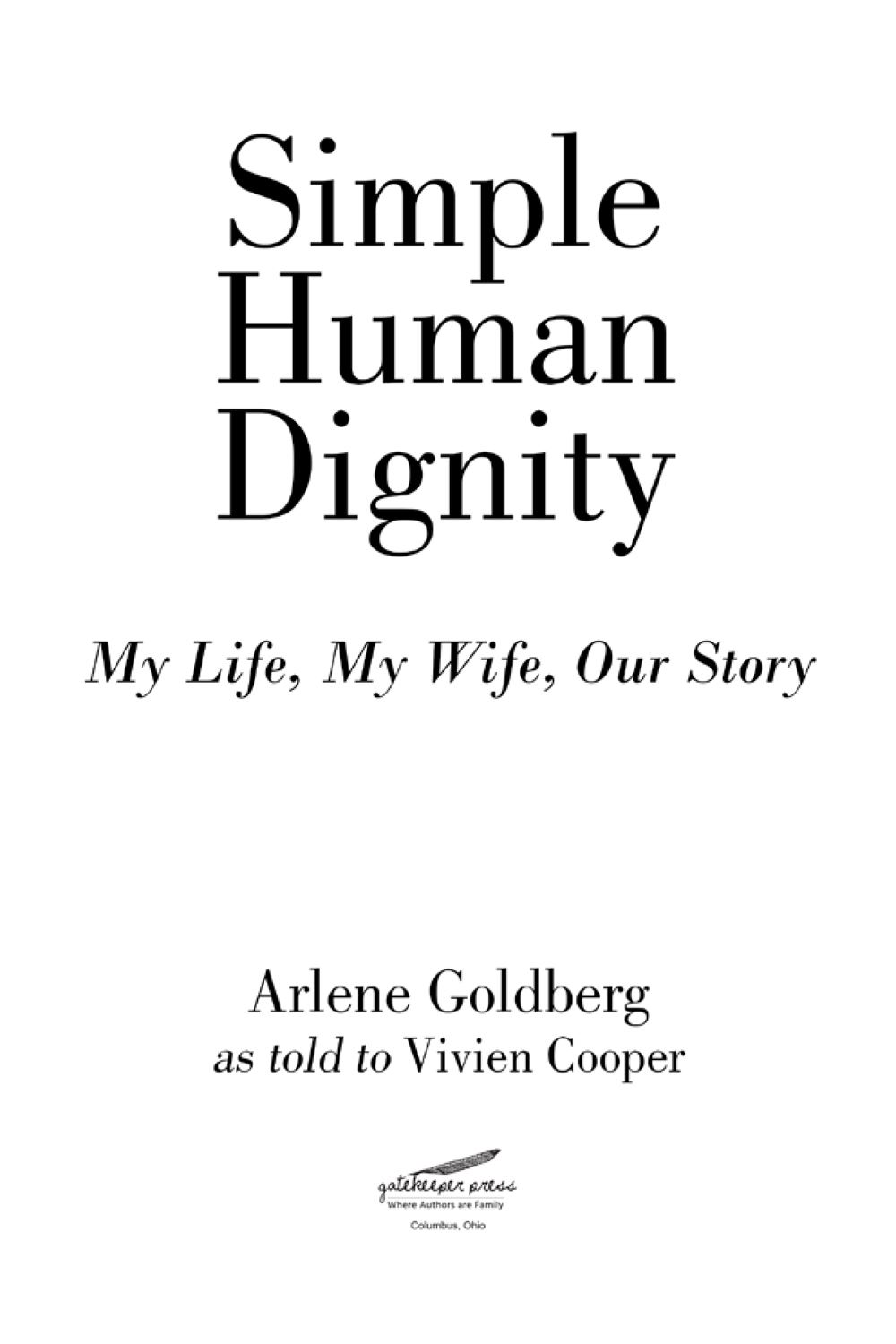
The views and opinions expressed in this book are solely those of the author and do not reflect the views or opinions of Gatekeeper Press. Gatekeeper Press is not to be held responsible for and expressly disclaims responsibility of the content herein.
Simple Human Dignity: My Life, My Wife, Our Story
Published by Gatekeeper Press
2167 Stringtown Rd, Suite 109
Columbus, OH 43123-2989
www.GatekeeperPress.com
Copyright 2020 by Arlene Goldberg
All rights reserved. Neither this book, nor any parts within it may be sold or reproduced in any form or by any electronic or mechanical means, including information storage and retrieval systems without permission in writing from the author. The only exception is by a reviewer, who may quote short excerpts in a review.
The editorial work for this book is entirely the product of the author. Gatekeeper Press did not participate in and is not responsible for any aspect of these elements.
Library of Congress Control Number: 2020944612
ISBN (paperback): 9781662904035
eISBN: 9781662904042
One
During World War II, women had taken jobs that needed to be filled, as able-bodied men went overseas for military duty. Now that the war was over, they faced the question of whether to remain in the work force or return to the kitchen, which was still thought to be their place at that time. In this climate, in New York City, a little girl was born to loving Jewish parents. They had no idea of the part their daughter would play in changing same-sex marriage laws in Florida.
It is 1947, nearly two years after the official end of the war. Harry S. Truman is the President of the United States, and post-war America is undergoing major cultural changes. The first African American news correspondent (Percival Prattis) is allowed into the U.S. House of Representatives and Senate press galleries, and a film named A Gentlemans Agreement is released and will win the Academy Award the following year.
The movie stars Gregory Peck whose character is a journalist who moves to New York City for a high-profile magazine assignment. He finds himself posing as a Jewish man in order to investigate antisemitism for the article. Our heroine will also end up spending much of her early life in New York, and hiding the truth about her life and love.
***
I was born on May 6th, 1947 in the Bronx, New York. My mother, Sylvia, was twenty-two, my father, Jack, was twenty-four and I was their firstborn child. (In those days, people tended to marry and start their families in their twenties.)
My maternal grandparents, Libby and Abe, knew that my parents couldnt afford their own apartment, so they took us in. Grandma Libby and Grandpa Abes apartment was in Hunts Point, a Bronx neighborhood filled with walk-up apartments. They lived in a two-bedroom apartment on the third floor of a forty-unit building.
Their daughter, my aunt Rhoda, was occupying the second bedroom. When we arrived, Aunt Rhoda was displaced from her room and slept on the couch. Grandma and Grandpa took one of the bedrooms and Mom, Dad and I stayed in the other.
Aunt Rhoda was sixteen years older than I and very sweet to me. She and her teenage friends would take me to the Bronx Zoo and on other outings. I loved the zoo and especially the ponies and the camels. One time while we were at the zoo, I fell and scratched my knee and Aunt Rhoda and her friends fed me ice cream and treated me like a little princess.
Two years after my birth, my younger brother Leslie (Les) was born. By the time he was two years old, the apartment would become too crowded for all seven of usour four-person family, as well as Grandma, Grandpa and Aunt Rhoda. We would move out and find our own place. It was a fourth-floor apartment on Vyse Avenue in the Bronx.
My grandmother was Polish, and Grandpa was Russian. Grandma was a very sweet lady with a love for poetry. She cut poems out of The Daily News and glued them into a diary book for safekeeping. I found that diary one day during my teen years when I was at their house, looking through drawers. The diary opened my eyes to a romantic side of my grandmother. This was a revelation to me.
Grandma Libby was a wonderful cook who handmade the most delicious Jewish food. I was especially fond of her kneidels. Grandmas were denser than other matzoh balls. She served them with carrots and sweet potatoes in a heavenly sauce.
Grandma was very submissive to my grandfather, a strong Russian house painter. That submissive side of her was the only side I ever saw. Grandpa never hit my grandmother, but he would chastise her if he saw her speaking to another man, or even a woman. So, Grandma didnt have any friends of her own. When she got older, she left my grandfather on two different occasionsbut she always returned to him.
One time I witnessed Grandpa yelling at Grandma in the middle of a big argument. Knock it off! I yelled at him.
He was shocked. Do not yell at me! he shouted back.
Ill yell if I want to, I said, defiant. Now stop yelling at her!
After our shouting match, it took a while for Grandpa and me to start speaking to each other again.
I never knew my paternal grandparents because my paternal grandfather died just as I was born. As the story goes, they were in business for themselves and so successful and wealthy, they had their own chauffeur.
Unfortunately, Grandpa was an alcoholic and he cheated on my grandmother. Jewish husbands typically are not cheaters but having alcoholism in the picture changed everything. My grandmother had a nervous breakdown over my grandfathers infidelity and ended up in a mental institution. Meanwhile, Grandpa found himself another wife. Sometime after my grandmother was institutionalized, my grandfather drove to a Philadelphia orphanage for Jewish Children and turned over all five of his children.
This is inconceivable to me. I never understood why Grandpa and his new wife wouldnt have kept the children with them. I would love to know the rationale behind it. Sadly, there is no one left to ask.
Of the five children, only one child was adopted outmy fathers younger sister who was adopted into a Christian family. My father, his one younger brother, and two older sisters all stayed together in the orphanage. There they would live out their entire childhood lives, each of them leaving only when they turned eighteen and were of age to be released into society as adults.
My parents were wonderful people. Mom was great and Dad was even greater. My father lived to make my mother happy. Having spent his entire childhood in an orphanage without love or affection, he cherished the love of his wife and family. He showed his love more than most people who have the luxury of taking love for granted.
Dad showed his love for us through his actions. He wasnt shown any love or affection growing up and never had anyone saying I love you to him. So, he was a bit awkward and aloof when it came to verbal expressions of his love and affection for us.
I would say, I love you, Daddy! Dont you?
Of course I love you! he would say.
Rather than become embittered over his time in the orphanage, Dad had learned to appreciate every little crumb he was given. When he got to play on the baseball team, he was thrilled. He played catcher and excelled in the game. When the kids were given one scoop of ice cream each week, my dad was elated and savored every bite. Once he had children of his own, he delighted in giving us big soup bowls filled with ice cream.


